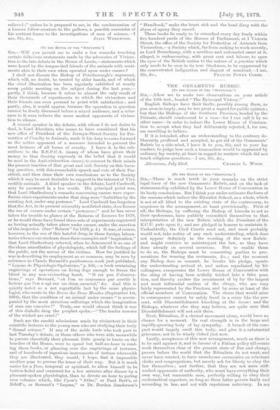ITO THE EDITOR OF THE " 81'EOTATOR.1 '
you permit me to make a few remarks touching certain fallacious statements made by the advocates of Vivisec- tion in the late debate in the House of Lords,—statements which were lseard by the tongue-tied friends of the animals with senti- ments akin to their own when operated upon under curare ?
I shall not discuss the Bishop of Peterborough's argument, which will, no doubt, be treated by abler hands, and of which the chief illustration has been regularly exhibited at nearly every public meeting on the subject during the last year,— partly, I think, because it refers to almost the ()lily result of their thousands of experiments to which the vivisectors and their friends can even pretend to point with satisfaction ; and partly, also, it would appear, because the operation in question cannot be freely discussed before a mixed audience, and a refer- ence to it soon reduces the more modest opponents of vivisec- tion to silence.
A second speaker in the debate, with whom I do not desire to deal, is Lord Aberdare, who seems to have considered that his new office of President of the Jermyn.-Street Society for Pre- vention of Cruelty to Animals, made it his duty to come forward as the 'active opponent of a measure intended to prevent the most heinous of all forms of cruelty. I leave it to the sub- scribers to the R.S.P.C.A. (many of whom have given their money to that Society expressly in the belief that it would be used in the Anti-vivisection cause), to connect in their minds the present inaction of that great and rich Society on this burn- ing question, with this remarkable speech and vote of their Pre- sident, and then draw their own conclusions as to the Society which it may be most desirable to support in the interest of Vivi- sectible animals. A third speaker in the debate, Lord Cardwell, may be answered in a few words. His principal point was, that Lord. Shaftesbury's remarks concerning curare were super- fl-aous, since experiments under that drug were "forbidden by the existing Act, under any pretence." Lord. Cardwell has forgotten that, the Act, in its present miserably mutilated state, does license the use of curare under certain "pretences ;" and he has never taken the trouble to glance at the Returns of licences for 1878, or he would there have found three sets of experiments registered , as having actually taken place under curare, under the sanction of the inspector. (See " Return " for 1878, p.4.) It was, of course, however, to the use of this hateful drug, in those foreign labora- tories whence our students draw their examples and." inspiration," that Lord Shaftesbury referred, when he denounced it as one of the sham anassthetics of physiologists, which lull the feelings of the public, not the nerves of the victims. How far justified he was in describing its employment as so common, may be seen by reference to Claude Bernard's posthumous work just published, " Lecons de Physiologie Op6ratoire," p. 168,—a book containing engravings of operations on living dogs enough to freeze the blood in any non-vivisecting heart. "Ii est peu d'observa- tions," says Bernard, "aim l'on no commence par avertir le lectern. que Pon a agi sur un chien curaris45," &c. And this is quietly noted as a not regrettable fact by the same physio- logist, who wrote in the Revue dee Dour Mendes (September 1st, 1864), that the condition of an animal under curare "is accom- panied by the most atrocious sufferings which the imagination of man can conceive!" Truly, one would almost think it was of this diabolic drug the prophet spoke,—" The tender mercies of the wicked are cruel!"
Such are the candid admissions made by vivisectors in their scientific lectures to the young men who are studying their truly "dismal science." If any of the noble lords who took part in last Tuesday's debate, or those others who were able meanwhile to pursue cheerfully their pleasant little gossip in knots on the benches of the House, were to spend but half-an-hour in read- ing these books, or glancing over the engravings of tortures, and of hundreds of ingenious instruments of torture wherewith they are illustrated, they would, I hope, find it impossible another year to pursue the tenor of their way. But it is much easier for a Peer, temporal or spiritual, to allow himself to be button-holed and crammed for a few minutes after dinner by a pleasant-spoken physiologist, than to devote an hour to poring over volumes which, like Cyon's "Atlas," or Paul Bert's, or &Mfrs, or Bernard's " Lecons," or Dr. Burdon Sanderson's "Handbook," make the heart sick and the head dizzy with the- abyss of agony they unveil.
These books lie ready to be consulted every day freely within five hundred yards of the Houses of Parliament, at 1 Victoria Street, the office of the Society for Protection of Animals from. Vivisection,—a Society which, far from seeking to work secretly, as Lord Beauchamp, with a needless and unfounded sneer at it, alleged, is endeavouring, with great cost and labour, to open the eyes of the British nation to the nature of a practice which only needs to be seen in its true blackness, to be suppressed by the concentrated indignation and disgust of mankind.—I am,.


































 Previous page
Previous page